Overview and general comments
The last curtain had hardly fell on Harry Kupfer´s Bayreuth Ring before he started creating his second Ring, this time for the Berlin State Opera and once again with Daniel Barenboim, who had become artistic director for the Berlin State Opera in 1992. Walküre opened in 1993 and complete cycles were played in 1996 and have been revived several times, latest around 2001-2. Subsequently, the production was sold to the Barcelona Teatro de Liceu. The present DVD box set are recorded live in Barcelona 2003-4.Harry Kupfer´s Bayreuth Ring was dark and pessimistic, though with a ray of hope.
Of this present Berlin/Barcelona Ring, Harry Kupfer´s view has "become fare more pessimistic, since we sit at the branch and continue to saw at it. It is even more violent. We hand down a world to future generations, of which we must be ashamed...The theme of this Ring, for me, is the realization that the emergence of human intelligence is the first step towards downfall."In brief: The humans capacity to destroy the world they live in, with emphasis on the destruction of nature. Which takes revenge, in the end.
For Kupfer, the main protagonist (as it was in Bayreuth as well) is Wotan "the sum of all intelligence".. "the possibility for humans to make things work" (which they, in the end, fail to do).
Where Kupfer´s preceding Bayreuth Ring operated on a horizontal axis (The endless road), his Berlin/Barcelona Ring operates on a vertical axis, centered around the World Ash, branching through the Tetralogy, serving as the anchor of the World. The setting is semi-abstract and the World Ash serves as a metaphor for the destruction of the human world, specifically mans destruction of nature, becoming increasingly withered until it ultimately dies.
When Wotan fashions his spear from a branch of the World Ash in the beginning of Rheingold, it (according to Kupfer) symbolizes the birth of civilization. Marks are left on the Ash by the inhabitants of the world, and plenty of vertical scene changes takes place in front of the eyes of the audience parallelling the destruction of the tree as the world becomes increasingly technological. Reflected as well by the advanced technological stage images in Siegfried and Götterdämmerung. Most of the individual stage direction and relations between the characters are similar to Kupfer´s previous Bayreuth Ring.
Hans Schavernoch designed the sets, which are semi-abstract, dark (the vastly dominating colour being dark blue) and superbly incorporating modern stage technology, such as the Bayreuth-lasers. A grid screen backdrop is seen throughout the Cycle, serving various functions according to the action. The use of light plays as pivotal role, changing according to the action, and often use to enhance the drama.
As a pure directorial concept, this is in fact the DVD-Ring, which most appeals to me. It captures the timeless mythology of the Nibelungen Ring as none of the other available stagings and I find the scenery dazzlingly brilliant and of a beauty, I have not encountered in any previous staging of the Ring.
Harry Kupfer´s trademark, the detailed personal instruction, remains. In Berlin he more or less worked with the excellent Bayreuth singing-actor cast, however these were in many instances exchanged (or had plainly aged by 15 years) for the Barcelona recording with singers of significantly less vocal and dramatic skills. Admittedly, most leading singers were approximating A-cast being top choices at the time. Ultimately, however, it did not work at all. To be blunt, the overall singing ranges from mediocre to below and none were compelling actors either (with one notable exception). And no-one was helped by Bertrand de Billy´s uninspired delivery either.
Compared to the other DVDs on the market, this Barcelona Ring suffers beyond repair from the mediocre musical execution, and despite the extraordinary staging, I cannot recommend it as a whole. I have been wondering, whether the recording technology may contribute to the fact that everything sounds dry on this release, however unfortunately I don´t think so.
Extremely disappointing considering the pre-eminent Kupfer staging.
Of the available versions, I´d overall recommend Kupfer´s previous Bayreuth Ring Cycle with Daniel Barenboim or Patrice Chéreau/Pierre Boulez Ring, also from Bayreuth. The Audi Amsterdam Ring is astonishingly beautiful, but suffers much the same casting problems as the Barcelona Ring. For a pure traditional approach, the Metropolitan Opera Schenk/Levine Ring is the only one on the market. For contemporary Regietheater, The Copenhagen Ring is definitely worth watching, as is the Stuttgart Ring. A complete overview of all commercially available Nibelungen Ring DVDs may be found here.
The individual operas - Rheingold
Before the beginning, civilization is born as Wotan tears a branch from the World Ash, which branches through this gleamingly beautiful Rheingold, and thus creates his Spear.
The World Ash is strong and omnipresent, creating a vertical axis for the stage action: The Rhinemaidens play around the roots of the Ash, with a Bayreuth-inspired laser peeping through; we then move up where the roots meet the trunk of the Ash - The world of the Gods; and down again to a Nibelheim infiltrated by the roots of the Ash via the first sign of technology: A transparent tube; And then up again. It is a staging of astonishing beauty. Everything is reflected in the huge mirror, which makes up the stage floor. As in Bayreuth, the Gods still wear laurels and Wotan is still a rogue. Metal constructions are is seen peeping up from behind the roots of the World Ash from the beginning - The battle of nature vs. technology has started.
At this point all is still relatively well, and this Rheingold is, by a large margin, the most successful part of the Tetralogy. Admittedly, Bertrand de Billy´s orchestra suffers his lack of a coherent vision of the work, however as the vocal demands of the singers are medium-level, the gleaming dark brilliance of Kupfer´s production tends to overshadow any musical shortcomings. And Graham Clark´s brilliantly acted (if less brilliantly sung) Loge and ditto with Günter von Kannen´s Alberich makes up for Falk Struckmann´s rather dry and mono dimensional Wotan.
Wotan tearing out the spear from the roots of the World Ash:
The Rhinemaidens with Alberich:
Alberich cursing love, while the gold lightens up the root of the World Ash in the background:
Gods and giants above, where the trunk of the World Ash begins:
Loge grinning and eating the last of Freia´s apples, while the Gods have fallen exhausted to the ground:
The descent to Nibelheim, located amongst the roots of the World Ash:
Alberich summons the Nibelungen:
Wotan "convinces" Alberich to part with the Ring:
Back on the plateau with Gods and Giants and Freia lying on the floor waiting to be covered in gold:
Erda appears from underneath, where the roots of the World Ash ends:
Danse macabre of the Gods in front of Valhalla:
Loge pulls the curtain, while the Gods ascend to Valhalla:
The individual operas - Walküre
Even Harry Kupfer, for all the detailed hands-on individual stage direction in the world apparently cannot make a convincing pair of actors out of Linda Watson and Richard Berkeley-Steele. Admittedly he is not helped by the fact that Sieglinde looks like her own grandmother. That Falk Struckmann is mostly sour and stubborn does not make for compelling drama either, though at least it is a sort of interpretation of Wotan, just not a very interesting one.
We are lightyears from Kupfer´s compelling Bayreuth-Walküre, indeed there is not a trace of anything compelling about this Walküre. And yes – the singers and the orchestra are to blame. The proof: Video postings of this Walküre-staging from Berlin 2003 with Waltraud Meier, Poul Elming, John Tomlinson (Wotan) and Daniel Barenboim.
Already at this point, the signs of human corruption appear: A branch of the World Ash (or perhaps it is the trunk?) has fallen off and constitutes the center (with both Nothung and the dinner table stuck inside it) of Hunding´s home. A major branch of the World Ash falls to the floor in the middle of Wotan´s monologue, just after "das ende". We see outlines of shattered concrete walls and the grid backdrop is visible throughout serving both as a barrier between Hunding´s home/the Act 2 scenery and the "outside" as well as the Walküre Rock. Consistent with the action in Walküre taking place in "one layer" so to speak, we don´t move vertically on the World Ash, but the entire action takes place in one plane.
We are lightyears from Kupfer´s compelling Bayreuth-Walküre, indeed there is not a trace of anything compelling about this Walküre. And yes – the singers and the orchestra are to blame. The proof: Video postings of this Walküre-staging from Berlin 2003 with Waltraud Meier, Poul Elming, John Tomlinson (Wotan) and Daniel Barenboim.
Already at this point, the signs of human corruption appear: A branch of the World Ash (or perhaps it is the trunk?) has fallen off and constitutes the center (with both Nothung and the dinner table stuck inside it) of Hunding´s home. A major branch of the World Ash falls to the floor in the middle of Wotan´s monologue, just after "das ende". We see outlines of shattered concrete walls and the grid backdrop is visible throughout serving both as a barrier between Hunding´s home/the Act 2 scenery and the "outside" as well as the Walküre Rock. Consistent with the action in Walküre taking place in "one layer" so to speak, we don´t move vertically on the World Ash, but the entire action takes place in one plane.
Siegmund, Sieglinde and Hunding with a declining piece of the World Ash:
Siegmund and Sieglinde:Siegmund pulls Nothung from the World Ash:
Wotan and Fricka:
Wotan:
Brünnhilde foretells Siegmund´s death as she paints his face white:
Wotan with his dead son:
The Valkyries:
Brünnhilde with Sieglinde:
Wotan and Brünnhilde:
Brünnhilde is left to sleep on a branch of the World Ash:
Technology has now gotten the upper hand of nature, with remnants of the World Ash scattered all over stage and technologically advanced scenery, such as a very technical layout of Mime´s Cave, dominates. We are back on the vertical axis, and Kupfer´s scenery is simply stunning.
Unfortunately, John Treleaven does not cut it as Siegfried. Neither vocally or dramatically to a degree, which it is truly not fair to elaborate on, taking into consideration that Siegfried admittedly is difficult to cast. And Treleaven is after all hired in this part on many major stages. While Deborah Polaski may sing the notes of Brünnhilde, she is far from creating a character. Combined with Falk Struckmann, whose dry Wanderer cunningly avoids maintaining the legato-lines, and still behaves as the spoiled, stubborn teenage-boy we saw in Walküre. Any attempt of life in this Siegfried comes from Graham Clark´s eternally busy Mime, however even he yells to much to my taste.
Siegfried´s world - branches of the World Ash are scattered all over the stage:
Mime´s (here subterranean) high-technological lair:
Wotan-Wanderer visiting:
Nothung is forged:
Alberich at Fafner´s lair:
Siegfried fights Fafner..
..and talks with him:
Siegfried listening to the Woodbird..
..and the Woodbird is controlled by Wotan:
Wotan summons Erda:
Wotan-Wanderer confronts Siegfried at the entrance to the Walküre Rock:
Siegfried in the grid of flames approaching the Walküre Rock:
Siegfried wakes Brünnhilde:
Siegfried and Brünnhilde:
The World Ash is now virtually gone. Shattered remnants of the World Ash fills the otherwise empty floor, where the Norns weave the rope, hanging from the last piece of the World Ash. Technology has invaded the, now cold and empty, world.
Presumably intended as an advanced technical installation, the Walküre Rock, as seen here most of all reminds of a washingmachine moving along the vertical now ex-World Ash axis. A sort of steel-constructed Watch-tower with radars is the center of the Gibichungen World. And as Siegfried meets the Rhinemaiden, they peep out from under a grey metal-construction elevated from the floor, presumably built at the place of the now withered Ash. The Rhine flows like the laser of The laser Ring.And how does the drama end? Wotan throws his broken Spear into the abyss created by Siegfried´s death. Hagen is devoured by the abyss. Alberich ends up with the Ring (he both sings and acts better than Wotan as well). But when he raises it in triumph it disintegrates and is destroyed. In the end we see two children on stage. But not, I suspect, as a token of hope as in Kupfer´s Bayreuth Ring. Here they rather look a manifestation of hopelessness.
While Hagen is intrinsic to the drama in Götterdämmerung, unfortunately Götterdämmerung does not take of if the drama is only created by Hagen. Which, more or less sums up Matti Salminen´s (though past his prime) riveting performance here. While Deborah Polaski and John Treleaven (Brünnhilde and Siegfried) continued the trend from Siegfried of the previous evening, I find the casting of several supporting parts (Gunter, Gutrune, Waltraute) strange: Surely, there must be more suitable singers around for these, after all, relatively lyrical parts. Especially Falk Struckmann as Gunter, now being as stubborn and childish as Wotan was in the previous three installments.
The Norns:
Siegfried and Brünnhilde on the "mountain-top":
Siegfried´s Rhine-journey:
The desolate world of the Gibichungen:
The three Gibichungen with Siegfried:
Gunther and Siegfried pledge faith - on Hagen´s spear:
Hagen´s Watch:
Brünnhilde and Waltraute:
Gunther (Siegfried with the Tarnhelm) overpowers Brünnhilde:
Alberich appears in Hagen´s dream:
Hagen´s Call (he summons the Gibichungen to celebrate the double wedding):
Gunter, with his less than excited bride:
The scene of the double wedding:
Brünnhilde, Gunther and Hagen conspire to kill Siegfried:
Siegfried meets the Rhinemaiden:
Siegfried tells his life-story to the hunting party..
..and in return he is killed by Hagen:
Wotan throws his shattered spear in the abyss after Siegfried´s death:
Gunther and Hagen quarrelling over Siegfried´s dead body:
Brünnhilde with the Ring - and Hagen lurking right behind her:
Brünnhilde sets the world of the Gibichungen on fire:
The Rhinemaidens lure Hagen:
The world of the Nibelungens in flames:
Alberich, finally with the Ring - note the children on the right:The singers
Generel comments: Admittedly, most major parts were cast with an A-list of singers performing these parts at all major opera houses. However, the net result, at least on DVD, was disappointing. More questionable is the casting of various smaller parts, which I would think not so hard to cast, with mediocre singer-actors.Wotan: Falk Struckmann is one of those singers vastly more effective live than on recordings. On this DVD his voice is rather dry with an incipient wobble in the middle and higher register and no legato-lines to speak off. Interpretatively the water is rather shallow: He is mostly stubborn and sour jumping up and down like an angered child. Unfortunately he offers no real competition for Sir John Tomlinson or James Morris on competing DVDs. Falk Struckmann was virtually the leading Wotan of the day around the time of this recording, and as there are not a wide array of superior Wotan´s available, it makes little sense to criticize him extensively.
Fricka: Lioba Braun is effective and convincing, both vocally and dramatically.
Alberich: Günter von Kannen repeated his Bayreuth Alberich, though with somewhat diminished vocal authority, while his stage authority is undiminished.
Loge: Graham Clark is a wonderfully energetic and charicatured Loge. Vocally, however, vocally he is rather thin often retorting to plain yelling and doesn´t match his former performance for Barenboim in Bayreuth.
Froh and Donner: Wolfgang Rauch (Donner) and Jeffrey Dowd (Froh) both made the most out of their limited possibilities.
Freia: Elisabete Matos is a rather shrill Freia.
Fasolt: Kwanchul Youn is a both sensitively sung and acted Fasolt.
Fafner: Matthias Hölle is unfortunately past his rather short prime as Rheingold-Fafner, but while he vocally not be in the league of the best, his authority on stage is superb. Not much was seen of Eric Halfvarsons effective Siegfried-Fafner.
Mime: Francisco Vas made a fine impression as Rheingold-Mime.
Erda: Andrea Bönig´s Erda is competent, but lacks the authority of the best of the DVD-competition (Birgitta Svendén in Bayreuth and at The Met, Mette Ejsing in Stuttgart).
Sieglinde: Linda Watson simply both looks and sings like Sieglinde´s (and Siegmunds) grandmother. Furthermore she is an unconvincing actress with a rather shrill voice marred by an excessive vibrato.
Siegmund: Richard Berkeley-Steele doesn´t look too bad for the part. Unfortunately he is severely overchallenged vocally, especially around the top. Furthermore he is no compelling actor.
Hunding: Eric Halfvarson doesn´t have the menacing presence or steady voice of the competition, which include Matti Salminen, Stephen Milling and Matthias Hölle.
Brünnhilde: Deborah Polaski arguably was top-casting for Brünnhilde and she can sing the part, though with a rather dry ring to her voice. Worst, however, is her unengaging stage appearance and failure to create drama, physically as well as vocally falling short of such DVD-Brünnhilde competitors as Anne Evans, Gwyneth Jones and Irene Théorin.
Siegfried: John Treleaven is a sympathetic artist as he is clearly giving everything he has as Siegfried. Unfortunately, it is far from enough. Personally, I find his appearance/acting irritating and vocally he is severely overparted. Not to speak of the complete lack of stage chemistry with Brünnhilde. As expected, he is no match for Siegfried Jerusalem (twice on DVD) and Stig Andersen.
Waltraute: Julia Juon has a fine voice and projects the drama in her monologue well. She does, however, look rather paralyzed throughout, possibly at the request of the stage director.
Hagen: Matti Salminen may vocally not be quite as strong as on his previous turnout for Levine, but he still makes a riveting Hagen, infusing much-needed drama into an otherwise unengaging Götterdämmerung.
Gutrune: Elisabete Matos´ Gutrune is both shrill and unappealing.
Gunther: Falk Struckmann sounds even more wobbly and dry as Gunther than he did as Wotan in the previous three installments of this Ring.
Unfortunately, Bertrand de Billy´s conducting is a major liability to this Nibelungen Ring. The shortage of interpretative ideas is simply staggering, and at no time does the music seem to flow. Rather, it is 1-2-3-4 from start to end. At least he conducts rather briskly (the only way to survive an idea-less Nibelungen Ring), but that does not save the orchestra for sounding appallingly mediocre. The quality of the orchestra may be fine as such, however Bertrand de Billy merely scratches at the surface in this very disappointing reading. Clearly the last choice on DVD regarding orchestral performance.
The highlights: Harry Kupfer´s timeless concept.
The lowlights: The muscial execution and much of the cast.
The bottom line (scale of 1-5, 3=average)
The ratings are given in comparison to the other Ring DVDs available. As ever, the acting skills of the singers weigh in heavily.
Falk Struckmann (Wotan): 2-3
Lioba Braun (Fricka): 4
Elisabete Matos (Freia): 2-3
Günter von Kannen (Alberich): 4
Graham Clark (Loge): 4
Kwanchul Youn (Fasolt): 4
Mathias Hölle (Fafner-Rheingold): 3
Eric Halfvarson (Fafner-Siegfried): 3
Graham Clark (Siegfried-Mime): 4
Francisco Vas (Rheingold-Mime): 4
Andrea Bönig (Erda): 3-4
Julia Juon (Waltraute): 4
Richard Berkeley-Steele (Siegmund): 3
Linda Watson (Sieglinde): 2
Eric Halfvarson (Hunding): 3
Matti Salminen (Hagen): 5
John Treleaven (Siegfried): 1-2
Deborah Polaski (Brünnhilde): 3
Elisabete Matos (Gutrune): 3
Falk Struckmann (Gunther): 2
Harry Kupfer´s staging: 5
Bertrand de Billy: 2
Overall impression: 2








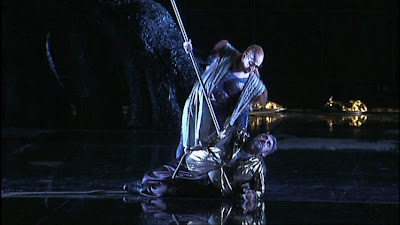



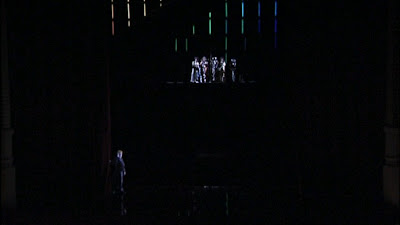






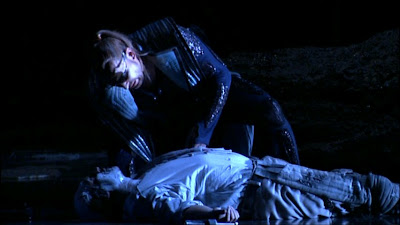





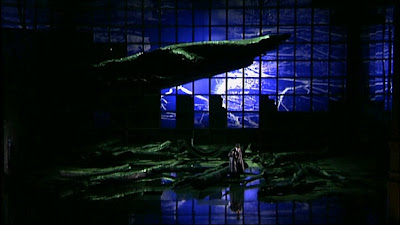














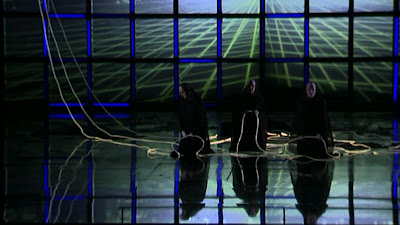

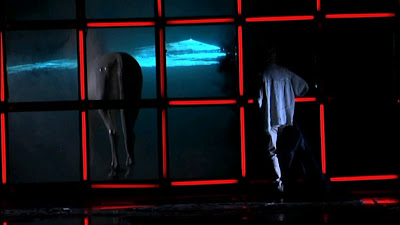



























9 comments:
Wotan cutting his spear from Yggdrasil DURING Rheingold’s prelude?
Hunding’s house built around Yggdrasil?
Brünnhilde spleeping on Yggdrasil’s branch?
Wotan throwing away his spear after Siegfried’s death?
The world of Gibichungen set to fire?
The Rhinemaidens luring Alberich at Götterdämmerung's end?
Alberich holding the ring at the end?
Yet another “mr.Regisseur’s Ring”. Wagner’s? Hardly.
I simply adore you for your reviews! You give such wonderful detail and great image captures! You're who I turn to when I want to know if a Wagner DVD is worth it!
Thank you, and keep up the awesomeness!
Just looking at the pictures, I can't imagine how you made it through this whole set. The production looks ghastly beyond all imaging. Yikes! Yet you manage to be reasonable and fair throughout your superb-as-ever-review.
And I second Tyrel B's words of praise. You've inspired me to start saving for two Barenboim Tristan DVDs (one with each Meier) and the Copenhagen Ring next - as you did earlier to buy a ticket for Ms. Meier's Sieglinde at the MET in April. Wish I'd been there for her Isolde last week!
With grateful applause,
MP
Daland:
Wotan cutting his spear from Yggdrasil DURING Rheingold’s prelude?
BEFORE the Rheingold prelude actually.
My typing mistake about the Rhinemaidens luring Alberich - they did actually lure Hagen, but you never know..
Interesting!!! Great post (I am waiting for your post from Boris in Dresden!! From Premiere maybe? :) )
I attended live those performances in Barcelona and I think you are quite right with your comments and marks. I remember that pretty much dissapointed with Deborah Polaski as I was expecting much more from her. I have always enjoyed the performances of Lioba Braun. I think it was not a good idea to release this dvds and the Liceo has been releasing too many mid-low class performance recordings.
Wotan cutting his spear from Yggdrasil BEFORE Rheingold’s prelude?
Still worse! Rheingold’s prelude tells us of the universe’s still, the norse Ginnungagap, the big-bang if one likes... long before gods and men came across polluting nature: putting Wotan ahead of it is like reading for first the last page of a thriller.
Esther - upcoming..
"Rheingold’s prelude tells us of the universe’s still, the norse Ginnungagap, the big-bang if one likes... long before gods and men came across polluting nature:"
This is just one of the interpretations of the prelude, and definately not the only one.
Wotan cutting his spear from World Ash Tree does happen before the events in the Rheingold, therefore this part of the Kupfer's staging makes a lot of sense.
Post a Comment